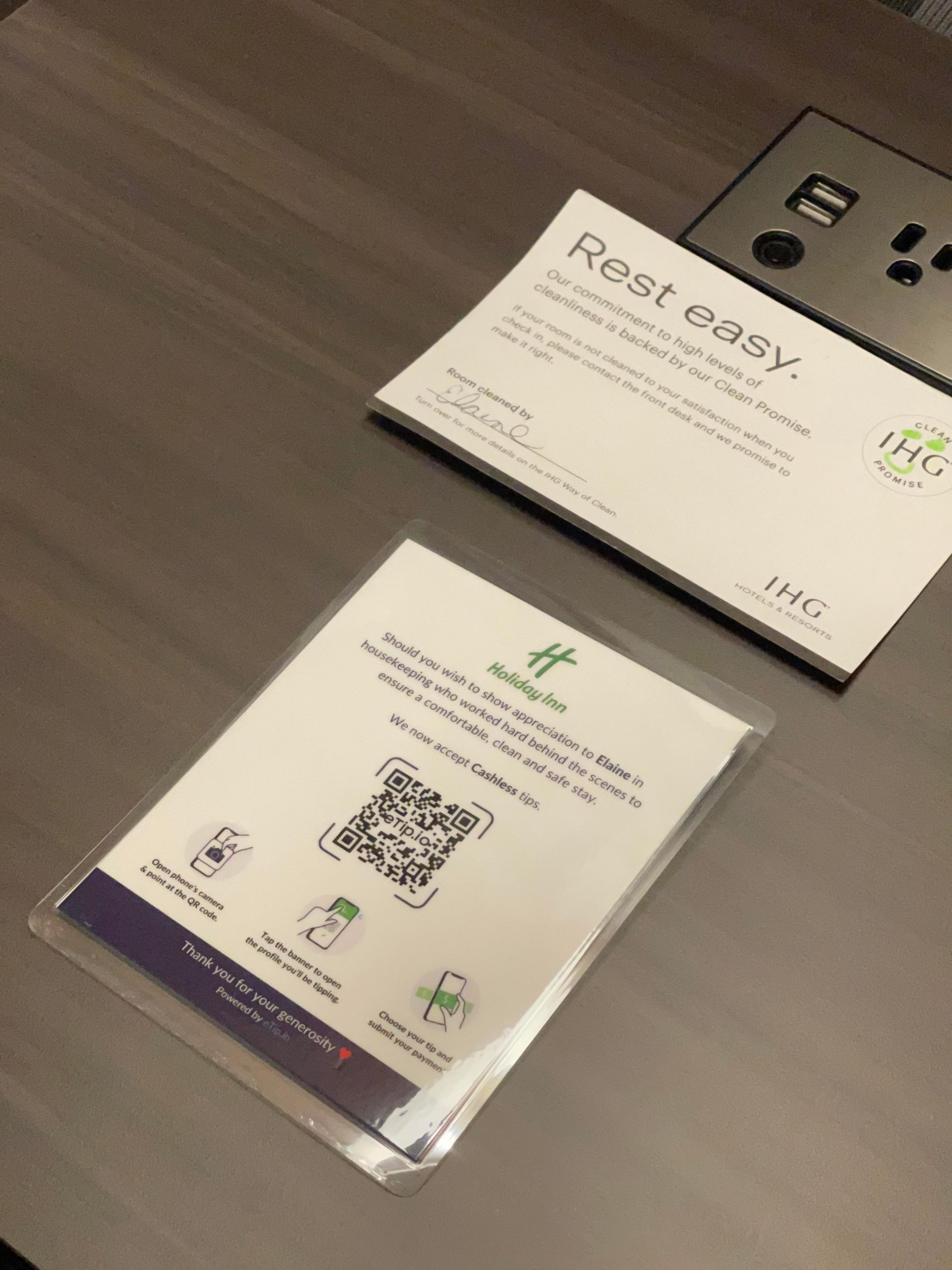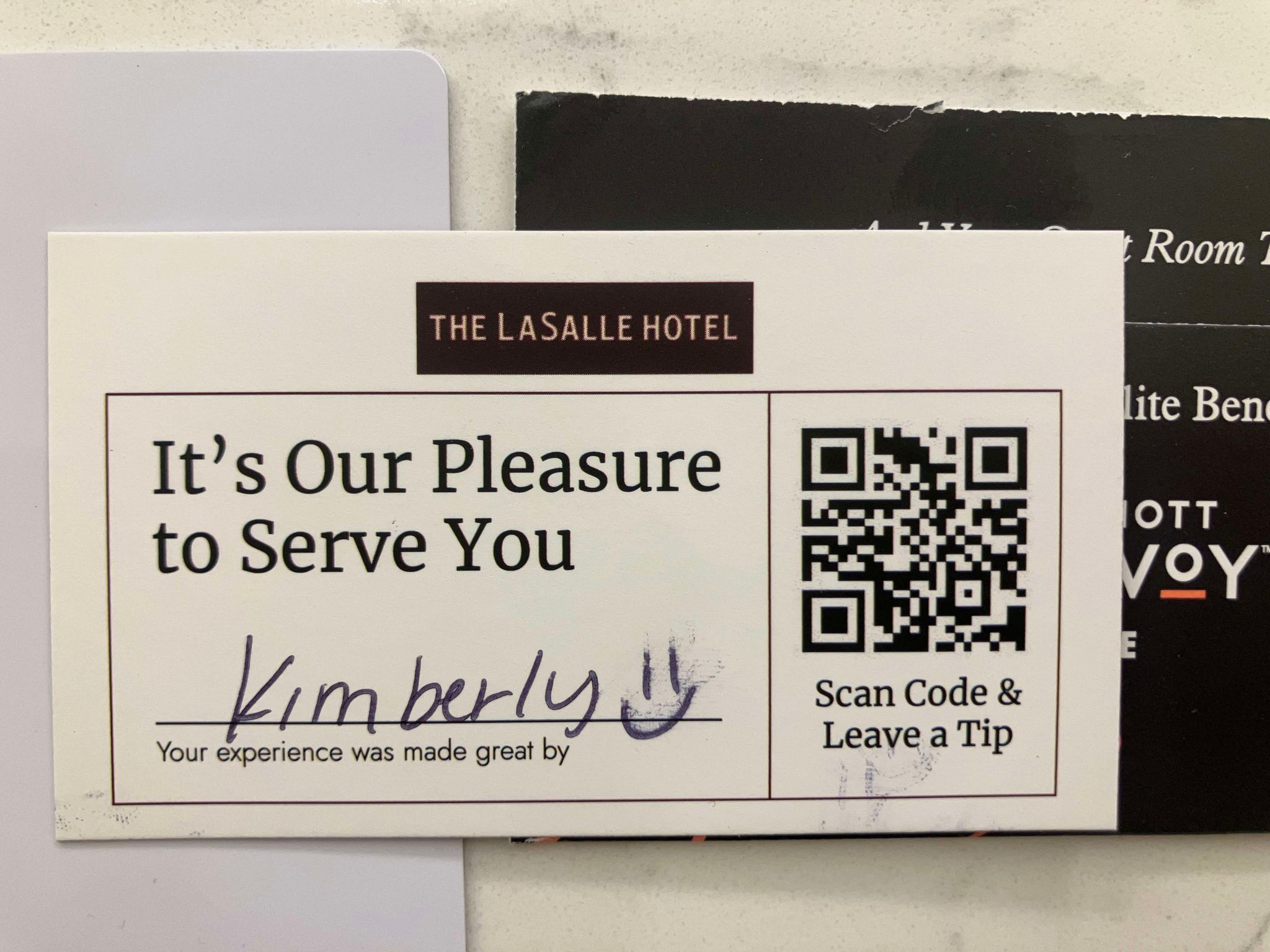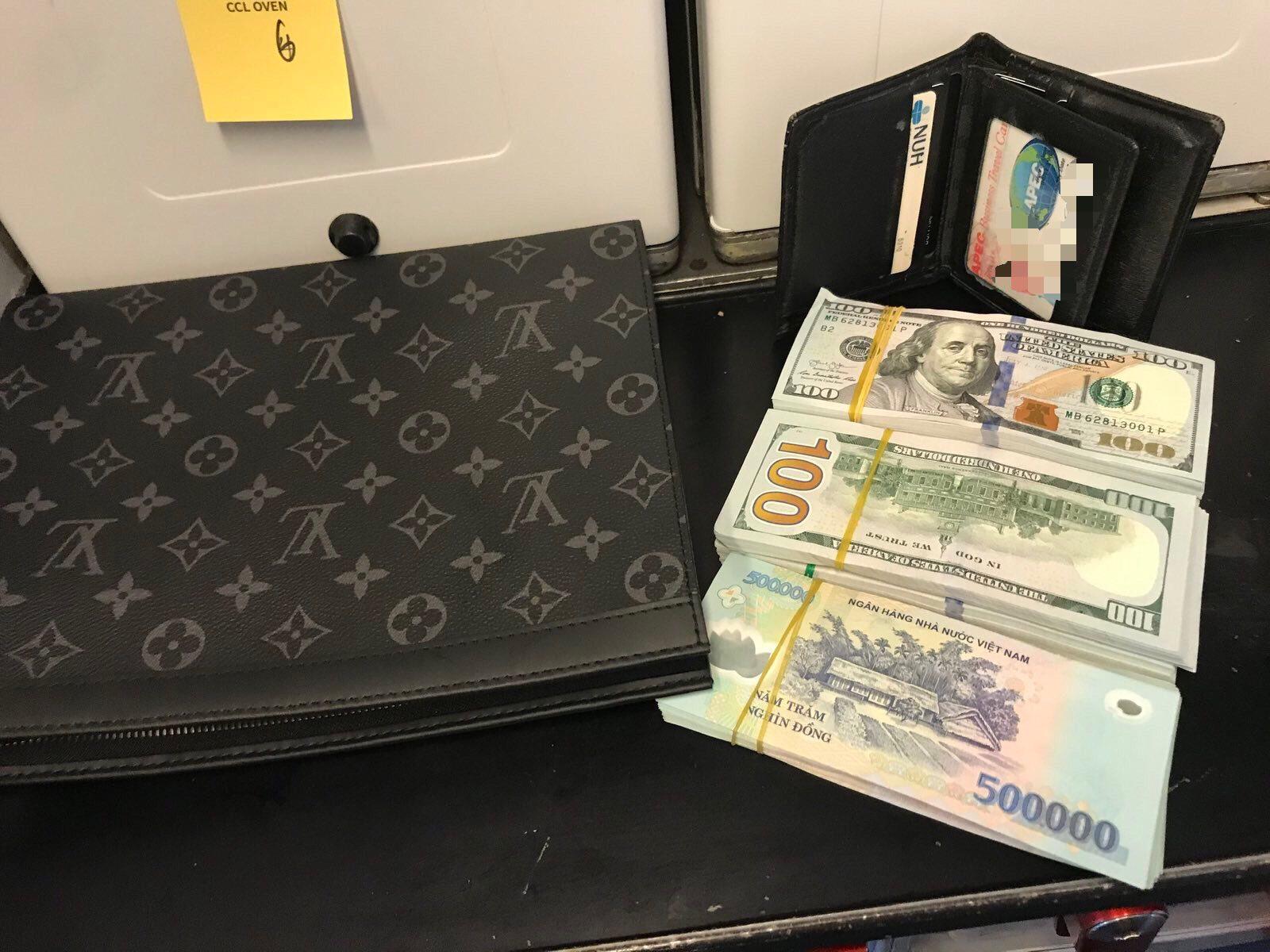When you tip at a hotel, where’s the money actually going? Often, this varies by location. In some places around the world, it’s common for service charges to be considered tips and pooled to be distributed to staff. In other places you can be pretty confident that tips are going to the person intended.
But not everywhere! There are countries where the tipped employee probably has to ‘kick up’ to a supervisor. And there are sketchy hotels that are keeping a portion of the tips for themselves! I’ve wondered if that’s especially true where QR codes are in use for tipping?
- QR codes finally found a use case during the pandemic. They were invented way back in 1994 by Denso Wave, a Toyota subsidiary, and used for tracking automotive components in manufacturing. They never quite took off in consumer use. Early smartphones didn’t have built-in QR scanners, so using them required extra steps and there just wasn’t a compelling reason for mainstream consumers or businesses to adopt them. Businesses and consumers had no strong push toward digital, contactless interactions until COVID-19.
- We started seeing QR codes for menus and various other applications. Hotels started using them to encourage tipping, which in turn allows them to pay workers less.
- QR code tipping is often a service provided by a third party. There isn’t just a credit card processing cost to the hotel there’s also a service charge from the provider.

Tipping via QR code has spread in hospitality so that you now may find QR codes for tipping the front desk staff who checks you in, not just housekeeping. There are also now airport hotels that encourage tipping the shuttle driver via QR code.

The Orlando airport Hyatt House and Hampton Inn & Suites share a shuttle, and encourage “tip with Zelle using QR codes.” According to a shuttle driver, though, they do not receive all of the tips. The third party provider being used, Grazzy, reportedly keeps 11% of whatever guests tip.
- Most QR-code tipping systems are run by third-party payment providers.
- These providers typically charge fees similar to credit card processors—often around 2–3% per transaction (sometimes with an added flat fee per transaction). While the rate varies by vendor, volume, and contract details, I’m floored by 11%.
- In most cases, the hotel absorbs the processing cost! While I’m not a labor lawyer, generally the Fair Labor Standards Act treats tips as the employee’s property once received from the customer. This means an employer isn’t allowed to deduct any business expense from the tip amount. Credit card processing fees aren’t 11%!
- Various state laws (like those in California and New York) generally mandate that tips are the sole property of the employee as well and impose greater restrictions on deducting credit card processing fees, but in no case can a state relax the requirements of the federal FLSA. Employers are prohibited from taking a share of those tips.
The practice of tipping already helps hotels because they retain workers, and they’re able to do so without paying more. The employee gets the income, whether it comes from the guest or the hotel. Keeping a share of it strikes me as especially shady.

I would expect major companies to understand and follow better practice. It would not surprise me that small franchisees might not. They might be unaware of the law and just think that of course they should only pass onto the employee the net amount, believing they shouldn’t have to pay a cost to cover tips.
It appears that the Hyatt House Orlando airport is owned by McKibbon Equities and managed by McKibbon Hospitality. McKibbon lists the Hampton Inn that shares this shuttle as one of their properties as well. Assuming that the employee’s explanation is accurate, they seem large enough to know better.
I’ve reached out to McKibbon Hospitality for comment and will update if they respond.


And that’s why you never tip at an hotel at all and you never tip via a QR code anywhere!!!
I always try to tip cash
Corporate crooks, what do you expect?
Don’t tip at all at a hotel. Case solved. For those of you that think that this is a cold hearted comment, just look at how tipping has become a disgrace in the past 3-4 years. If we all stop tipping everywhere (except waiters and waitresses in restaurants), employers will be forced to raise wages when they can’t get descent workers anymore. If the tipping culture keeps growing, the chaos will become even worse. Enough is enough. I go to Europe several times a year and I don’t see any of this nonsense that we see here. Hotels have returned to full services unlike here in in our country.
If you want to tip someone, hand them cash physically. I always carry a stack of $2 and $5 bills for that purpose.
If you’re tipping a person (anywhere), tip them in literal hard-currency.
Cash is king. No cards. No QR codes. No websites. And discretely is better than overtly. Maybe include a heartfelt ‘thank you,’ and a hand-shake with eye contact, unless that’s culturally or legally inappropriate wherever you are. The least they can do in return is to say, ‘no, thank you, we are not allowed to accept tips.’ Then you insist, again, and if denied a second time, then, put it away.
One important caveat: Never initiate a ‘tip’ to law enforcement or immigration/customs officers at an airport or border crossing (unless it is the ‘expectation’ in a ‘backwards’ place). Use your brain!
My most recent Uber driver told me he never sees exactly what a customer has tipped; only the company sees that. And the company takes some of the tip. He knows that because a recent customer was a repeat the next day, and the guy asked him if he got his $30 tip. He only got $23 from the company and had no idea the customer had tipped him $30. Tip in cash!
(unless it is the ‘expectation’ in a ‘backwards’ place)
Like Miami?
@farnorthtrader — *sigh* No, Miami’s actually quite nice (as are the Keys); other parts of Florida? I can personally attest to not having the best time. Alas, there are good and decent folks everywhere, and there are unsavory types…everywhere. To each their own, though. You do you!
@Fernsie, this is coming regardless because we are deporting the only people who want to do the job of scrubbing the shit from the hotel toilets. Hope everyone knows how to make their own hotel bed and fixing their own roof within a couple of years.
https://www.dol.gov/agencies/whd/fact-sheets/15-tipped-employees-flsa
FLSA literally says the opposite “Under the FLSA, when tips are charged on customers’ credit cards and the employer can show that it pays the credit card company a percentage on such sales as a fee for payment using a credit card, the employer may pay the employee the tip, less that percentage. For example, where a credit card company charges an employer 3 percent on all sales charged to its credit service, the employer may pay the tipped employee 97 percent of the tips without violating the FLSA.”
Some state does impose restrictions where employer has to eat the cost of the tip fee.
Most third party providers offer a daily pay service for a fee to the employee. Employees can also have tips automatically loaded onto a debit card or it can be paid out monthly on their paychecks.
At least two of the big boys have express policies about not passing the c/c and/or admin fees on to employees.
Since the pandemic and because we are increasingly cashless, room attendants have seen their cash tips drop by over 70%. This solution solves that.
I have always tipped cash from my own hand. I include my mail carrier who. For some reason is not allowed to accept. Ridiculous. Santa has to attend to EVERY ONE! It works fine for us. No conversation necessary. If they declined I mutter something like, “, Just give it to someone you love.”
Just tip in the local currency, we want the actual person serving us to get our actual money. There’s only one way to guarantee that: cash If you can plan and execute all the details of a trip, you can certainly make sure you have local cash in small bills. To do otherwise is a disservice to people who work very hard for often very low wages.
Why would anyone support a system that allows profitable corporations to avoid paying their workers a reliable living wage in the first place?
For those who do, it’s only logical to get scammed twice.
The best, and only, solution is to STOP THE TIPFLATION
I am sick of this tipping virus thag has gripped every place.
But if you have the craving to keep tipping, always tip cash and directly to the person you want to tip.
11% is ridiculous. I used to always tip cash before I left the hotel room but have since stopped. I feel bad sometimes but to the points mentioned it might be for the best long-term. Also it’s pretty normalized now to have to not have cash on hand, at least in America so that helps.
I checked into a motel near a National Park. It was a long drive. I was tired. While checking in, I was asked whether or not I wanted to leave a tip for housekeeping and I said yes. Even though I knew I probably had cash. Big mistake. It’s a percentage of the total bill and much more I would normally tip.
Maybe I’m looking at this the wrong way- I need to get in on the action. I should start one of these QR code tipping services but undercut the competition just a little, maybe a couple percent less holdback. Man, what an awesome side hustle that could be!
Blah, blah, blah tipping. Yawn, yawn, yawn tipping.
Let me tell you something, whether people tip or not, hospitality companies are NOT going to start paying people more. The thick as a brick types on this site like to continue to beat that dead horse except it’s simply not true.
For the umpteenth time, the industry has a very long track record (long as in forever) of low pay, little to no benefits and last second irregular work schedules. Unless there is a CBA in place (which applies to such a microscopic amount of people in hospitality that it’s almost irrelevant to bring up) these are the facts of how things are run whether you are at a corporately managed property or a franchise. There’s a certain line from a Bruce Hornsby song that is definitely applicable here.
The final real answer is this.
Unless you are putting cash in palm of the exact person you want to get the tip, always assume that the owner or management company is skimming off a percentage either for themselves or to cover the “processing costs” of the QR code or that some middle entity (manager/supervisor) is stealing it/keeping a percentage or that the QR code at goes into a pool for the entire department versus a singular person. There is zero transparency with those codes and just because it says X, come on Cuz, it could go anywhere, and you would have no clue.
“I’ve reached out to McKibbon Hospitality for comment and will update if they respond.”
Of course they won’t respond. Why would they? You’re nobody. They don’t owe you anything and it’s comically delusional if you think they do owe you an answer.
@The Road Goes On Forever — Nice reference. I presume you’re referring to ‘The Way It Is,’ which mocks societal greed and complacency (‘just get a job’), and celebrates the ongoing fight for civil rights (’64’) and working people. ‘But don’t you believe them.’
We can call it collective bargaining agreements, or simply ‘clear expectations’ between employers and employees, to avoid such corruption and mistreatment–yeah, I’m sure greedy owners hate it.
Oh, and let’s be honest: We’re all ‘nobodies’ here.
How hard is it to just carry cash for tips? This is just part of being an adult and a good person (in the US).